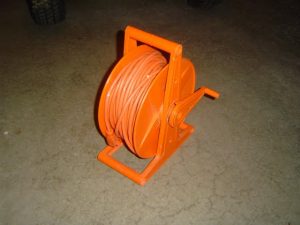Heavy Duty Extension Cords should always be used on Home Improvement Projects
By Mark J. Donovan
|
|
Aah, the ubiquitous and often under-rated extension cord. DIY homeowners use them every day on home improvement projects and never think twice about them. Besides providing “juice” to their power tools they are otherwise perceived as static devices that provide little additional value. However, extension cords, and particularly heavy duty extension cords, play a much bigger role in a home improvement project than most people realize.
At the 50,000 foot level, a heavy duty extension cord does indeed provide the “juice” that powers the table saw or drill, and without these tools a home remodeling project may never be completed. |
At the ground level, however, the type of extension cord used on a home improvement project can also make the difference between getting a job done, and getting a job finely done. For example, using an excessively long, and low current rating extension cord, versus a shorter length, higher current rating extension cord, can make the difference in producing ragged cuts, or clean and consistent cuts when using a table saw. Simply put, not all extension cords are created equal.
| When working on any home improvement project heavy duty extension cords should always be used. A heavy duty extension cord should include three conductor wires that are isolated from each other, and encased in a heavy-duty, water tight sheathing. One conductor wire is used as the “hot” wire, another as the “return” wire, and the other as the ground wire. The conductor wires themselves should be 16, 14, 12, or 10 gauge. For most home construction projects, heavy duty extension cords with 12 or 10 gauge conductor wire are used.
In addition, polarized receptacles and plugs, as well as ground terminals should also be part of any heavy duty extension cord. |
 |
When selecting a heavy duty extension cord there are a few key factors that you must consider before buying one. First, it is important to know the current rating of the outlet you plan on plugging the extension cord into. The National Electrical code specifies that the minimum gauge extension cord that can be plugged into a 20Amp rated outlet is 16 gauge. Using a smaller gauge extension cord could result in the extension cord overheating and potentially causing an electrical fire.
If the voltage level presented to the tool is significantly lower than this, due to excessive extension cord length or insufficient wire gauge, the tool may not operate properly or become damaged. In general, the longer the heavy duty extension cord length, the large the wire gauge that should be used in the construction of the extension cord.
So before you plug in any old extension cord, understand what you are plugging it into, what tools you plan on connecting to it, and what length of an extension cord you really need.
For help on building a new custom home, see HomeAdditionPlus.com’s New Home Construction Bid Sheet. The New Home Construction Bid Sheet provides you with the knowledge on how to plan a custom home building project, and what to look for when hiring contractors for your new home construction. It also includes a detailed cost breakdown table and spreadsheet for estimating your own new home construction building costs.
Related Information
Additional Electrical Wiring Resources from Amazon.com
 |
 |
Free Home Addition Price Quotes with No Obligation!
Fill out our 3-5 minute quick and easy form, and receive a free price quote on a house addition from one of our prescreened and licensed home addition contractors. This process is free and there is no obligation to continue once you receive your house addition price estimate.

